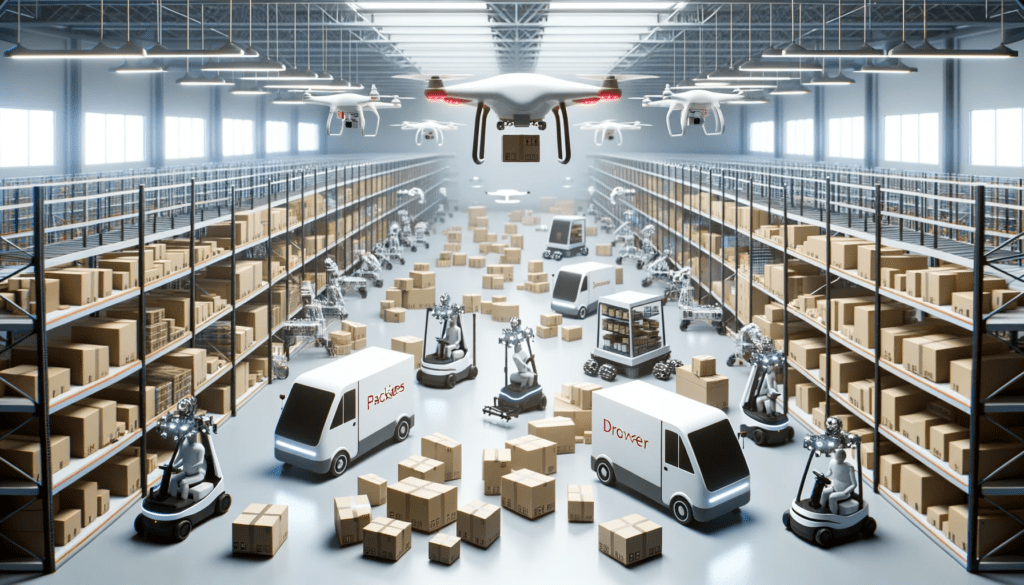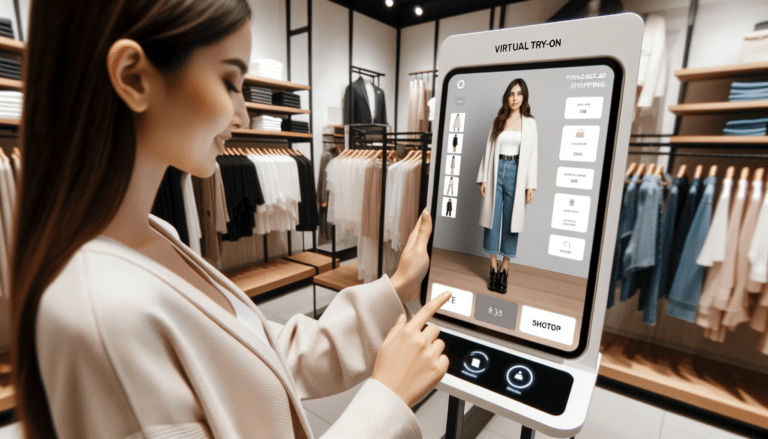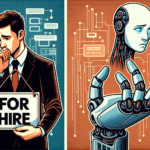The future of AI in Retail Sector
Artificial Intelligence (AI) is playing an increasingly pivotal role in the retail sector. The future of AI in retail speaks volumes about how businesses are relying on these technologies to remain competitive in the market. Historically, AI has revolutionized retail by rendering numerous operational facets more efficient and effective. As businesses become more customer-centric, the use of AI has also resulted in unique personal shopping experiences that are reshaping the entire retail industry.
One of the most prominent areas where the future of AI in retail shines noticeable is consumer experience enhancement. Through AI, businesses can offer personalized shopping experiences with the assistance of virtual try-ons and real-time AI-powered recommendation systems. Operational efficiency is another promising aspect, enabling retailers to improve their inventory management through AI and engage in predictive analytics for demand forecasting.
Furthermore, the future of AI in retail holds the potential of automating checkouts, resulting in increased convenience for the customers and reduced operations cost for the businesses. These are just a few glimpses of the vast potential that AI brings to the retail sector.

The Promising Progress of AI in Retail
Artificial Intelligence (AI) is steadily penetrating the retail sector, promising to revolutionize the way businesses operate, interact with customers, and compete in a rapidly evolving marketplace. From personalizing consumer experiences to enhancing operational efficiency, the future of AI in retail holds significant potential that is presently being unveiled, gradually transforming the retail landscape.
One of the most notable advancements in AI is the enhancement of the consumer experience. AI-powered solutions such as virtual fitting rooms and personalized recommendation systems are paving the path for the future of AI in retail, striving to offer consumers a seamless and personalized shopping experience like never before. The ability of AI to analyze vast datasets enables retailers to tailor their offerings to individual consumer preferences, a trend that is expected to define the future of the retail sector.
On the operational front, AI is dramatically improving efficiency, particularly in terms of inventory management and demand forecasting. The use of AI and predictive analytics allows retailers to effectively manage their stocks and accurately forecast consumer demand, minimizing losses, and optimizing supply chain efficiency. AI is also behind the retail industry's shift towards automated checkouts, a novel trend that is projected to be the new retail norm in the future.
| Aspect | Description | Examples/Applications |
|---|---|---|
| Consumer Experience Enhancement | AI can personalize the shopping experience by analyzing consumer behavior and preferences. | AI-powered recommendation systems, Virtual try-on technologies |
| Operational Efficiency | AI helps streamline operations, reduce costs, and improve decision-making through data analysis. | Inventory management, Automated checkouts, Predictive analytics for demand forecasting |
| Supply Chain and Logistics | AI optimizes supply chains and logistics through predictive analytics and real-time monitoring. | Smart logistics, Predictive maintenance, Real-time tracking |
| Marketing and Customer Engagement | AI enables targeted marketing and improved customer engagement through data analysis. | AI-driven marketing campaigns, Chatbots, Sentiment analysis |
| Emerging AI Technologies | New AI technologies are being developed to further enhance retail operations and customer experiences. | Robotics and autonomous delivery, Augmented Reality (AR) |
| Challenges and Ethical Considerations | There are ethical concerns and challenges that come with implementing AI in retail. | Data privacy, Addressing bias in AI algorithms |
| Case Studies of AI Adoption | Several retail businesses have successfully integrated AI to enhance operations and customer satisfaction. | Case studies showcasing innovative retailers and lessons learned |
| Future Projections | AI is projected to continue transforming the retail sector, making operations more efficient and enhancing customer experiences. | Projections for AI-driven retail landscape by 2030 |
AI's role in supply chain and logistics is equally transformative. AI driven supply chains and predictive maintenance of logistics equipment are becoming increasingly commonplace in the retail sector. By leveraging AI technology, retailers can ensure smooth logistics operations, predicting when maintenance is required and preventing costly downtime. These technological advancements are geared towards establishing an AI-driven supply chain, reinforcing the belief that the future of AI in retail indeed looks promising.
Equally important is AI's growing impact on marketing and customer engagement. AI-driven marketing strategies and the deployment of chatbots for customer communication are demonstrating how AI can transform the way retailers engage with their customers. Technologies such as sentiment analysis are also enabling businesses to glean meaningful insights from consumer behavior and feedback, thereby improving customer relations and shaping future marketing efforts. The adoption of AI in these areas illustrates its potential to boost both customer satisfaction and revenue generation in the retail industry.
Looking ahead, the future of AI in retail is hinted at in the emergence of new technologies such as robotics, autonomous delivery, and augmented reality (AR). These technologies promise to further enhance the retail experience, leading towards a future where AI-driven strategies are at the heart of retail operations. Nevertheless, as the use of AI in retail increases, it's vital to address challenges and ethical considerations such as data privacy and bias in AI algorithms. These are significant concerns that warrant attention as we move towards an AI-integrated retail landscape.

Initiatives are already underway, with innovative retailers demonstrating how AI can be effectively utilized in a retail environment. These early adopters are helping to pave the way for others, illustrating how to navigate the challenges associated with AI adoption and demonstrating the benefits of integrating AI into retail strategies. However, as we look towards the future of AI in retail, it's clear that this is just the beginning. By 2030, the retail landscape could be significantly different, shaped largely by AI technology. Preparing for this AI-driven transformation is essential, as the future of retail clearly points towards an era of AI-integration. As retailers sit poised at the outset of an AI revolution, the question is not whether they will adopt AI, but how quickly they can adapt to its transformative power. As such, embracing the promising future of AI in retail seems not only advantageous but also crucial for survival in an increasingly competitive retail space.
The Impacts of Retail AI on Consumer Experience
Artificial Intelligence (AI) is dramatically transforming the retail industry, affecting everything from inventory management to customer experience. As technology evolves, it opens up a broad spectrum of possibilities for improving and personalizing the retail experience. One significant impact of AI in retail has been the enhancement of consumer experience through tools like personalized shopping and virtual try-ons.
The future of AI in retail is closely tied to providing these personalized experiences. Technological advancements have made it possible for retailers to provide a diverse range of products tailored for individual customers, courtesy of AI-powered recommendation systems. This means that marketing campaigns can now be more focused and accurate in predicting what items a shopper is likely to purchase. Further, virtual try-ons, another byproduct of retail AI, is undeniably revolutionizing the future of fitting rooms. Shoppers can now virtually 'try on' clothes from the comfort of their homes, a feature that has become increasingly important in the modern era of online shopping.
The future of AI in retail extends far beyond personalization and virtual experiences. It plays a significant role in enhancing operational efficiency. AI applications in inventory management allows for more precise planning in stock handling and prediction of future demand patterns. Retailers can now ensure they have the right products at the right time to avoid overstocking or under-stocking, leading to optimized inventory costs. This improved efficiency brought about by AI is poised to redefine future retail operations.

Similarly, predictive analytics for demand forecasting is the way forward. The ability to accurately forecast future sales based on historical patterns and current market trends will give retailers a considerable advantage. Automated checkouts, another feature of AI's future in retail, enhances the shopping experience by reducing long waiting times, thereby maximizing consumer convenience.
Taking a look at all these developments, enabling efficient communication between consumers and businesses is a key aspect of the future of AI in retail. AI-powered chatbots play a vital role here, enhancing customer engagement by providing immediate responses to queries and shopping assistance. Furthermore, sentiment analysis tools can help evaluate customer feedback, allowing brands to improve their products and forge stronger relationships with customers.
Artificial Intelligence Transforming Retail Businesses
As we advance further into the digital age, the future of AI in retail becomes more deeply entwined with business strategies and consumer expectation. From its historical evolution in retail, Artificial Intelligence no longer exists as an anticipated future technology, but rather a current instrument altering the way business operations are conducted. Enhancements in consumer experience have skyrocketed with the integration of AI into retail systems, allowing shoppers to receive highly personalized experiences tailored to their tastes. Through the use of AI-powered recommendation systems and virtual try-ons, the future of fitting and shopping is being reimagined, providing shoppers with all the conveniences of modern technology.
The operational efficiency of retail businesses has also greatly improved with the utilization of AI. From inventory management through AI to predictive analytics for demand forecasting, the future of AI in retail seems to be marking a new era of precision and efficiency. Automated checkouts have become the new retail norm, speeding up transactions and elevating the shopping experience. AI's role in supply chain and logistics has also seen substantial transformation with smart logistics, predictive maintenance of logistics equipment, and real-time tracking systems. The future of AI in retail promises a seamless integration of digital convenience and physical retail interactions.
The Use of AI in Enhancing Retail Operations
Artificial intelligence is progressively being assimilated into retail sector operations, marking the future of AI in retail. The integration of AI is transforming traditional retail work mechanisms into more efficient, automated, and data-driven operations. Inventory management is one significant area where AI is making substantial strides. By leveraging AI, retailers are able to monitor stock levels in real time, predict inventory demand, and even automate the reordering process to avoid overstocking or understocking situations. Such AI-powered systems significantly reduce human errors, ensuring operational efficiency and cost savings.
This future of AI in retail also involves revolutionizing the checkout process. Automated checkouts powered by AI and machine vision technology are becoming the new retail norm. Customers can simply walk into stores, pick up the items they want and walk out, with the payment automatically processed. This technology eliminates long queues and waiting times, thus enhancing customer experience and increasing sales. Furthermore, AI is coming to play a fundamental role in the retail supply chain management, through predictive maintenance of logistics equipment, thus ensuring timely and efficient delivery of goods. Undoubtedly, the future of AI in retail is promising and set to revolutionize retail businesses across the globe.
The Strategic Importance of AI in Retail Marketing
Artificial intelligence is rapidly carving out an imperative role in revolutionizing traditional retail marketing avenues. Through the employment of advanced AI-driven marketing strategies, retailers have identified an effective vehicle to bridge gaps in communication, gain deeper insights into customer behavior, and provide a more personalized shopping experience. Interestingly, predictive analytics for demand forecasting has become one of the key applications of AI, equipping retailers with the ability to accurately forecast trends and stock inventory accordingly. This aids in curtailing the number of lost sales due to products' unavailability and promoting operational efficiency. From this perspective, one can easily observe that the future of AI in retail isn't merely restricted to client interaction but extends to internal processes as well.
Emphasizing on the incorporation of AI in retail's future, it's evident that technologies like chatbots are becoming salient tools in enhancing customer engagement while augmenting the brand's marketing efforts. These AI-powered bots sift through oceans of data to provide personalized product recommendations, thereby igniting a dramatic shift in the traditional customer shopping experience. Moreover, AI’s role in sentiment analysis is also instrumental in improving customer relations as it aids brands in understanding the customers' sentiments about their products and services, thereby facilitating proactive improvement. The successful implementation of AI-powered solutions in retail marketing upholds much promise for an AI-integrated retail landscape, highlighting the upcoming future of AI in retail.

Artificial Intelligence in Retail: Current Trends and Developments
The future of AI in retail is increasingly becoming today's reality with its widespread adoption and innovative applications. The historical evolution of AI in retail began with general in-store enhancements - improving various aspects such as customer experience, inventory management, supply chains and even marketing strategies. Retailers saw the potential scope of AI and gradually started integrating it into their operations for a smoother and more efficient workflow.
For instance, one of the significant developments is the use of personalized shopping with AI, a system devised to understand and cater to customer preferences better. The future of AI in retail doesn't just stop with enhancements but promises a significant shift in customer experience like the advent of virtual try-ons, a testament to how AI is revolutionizing the shopping and fitting experiences.
Massive strides have also been made in the direction of operational efficiency. AI has established a robust footing in retail operations, notably in inventory management and predictive analytics for demand forecasting, thereby enhancing the efficiency of supply chain management. The concept of automated checkouts is another interesting trend shaping the future of AI in retail, providing faster and hassle-free shopping experiences. Furthermore, AI has made remarkable improvements in marketing and customer engagement.
AI-driven marketing strategies are aiding retailers in reaching out to their target audiences in a more effective and nuanced manner. For instance, chatbots are bridging the communication gap, while sentiment analysis lends a helping hand for improved customer relations, presenting a more personalized and responsive retail environment.
How Artificial Intelligence is Changing Retail Store Dynamics
In the brick-and-mortar retail space, the emerging role of artificial intelligence is significantly transforming store dynamics. The rapidly progressing future of AI in retail brings forward innovative technologies that are reshaping traditional retail experiences. Tools powered by AI are employed to assist shoppers in selecting the perfect product, cater to their personalized shopping preferences and create AI-powered recommendation systems that enhance customer loyalty. Moreover, the future of AI in retail extends to the emergence of virtual try-ons, a development that revolutionizes the product fitting experience and promises a touch of personalization to customers.
At the operational level, AI's impact is largely visible in the robust inventory management systems implanted in retail stores. Enhanced by AI, these systems adeptly manage stock levels and predict future demand, reducing wastage and keeping stores well-stocked based on consumer behavior and sales history. With AI in the lead, the future of AI in retail predicts the advent of automated checkouts, giving customers a seamless and line-free shopping experience. AI's reach also extends to the realm of supply chain and logistics, ensuring operational efficiency and predictive maintenance of logistics equipment. Smart logistics and AI-driven supply chains can streamline operations, helping retailers meet consumer needs promptly.
The Application of AI in Retail Supply Chain Management
Artificial Intelligence continues to redefine the operational dynamics in the retail sector, particularly enhancing the efficiency of supply chain management. AI in retail empowers businesses to maintain an optimal level of stock, facilitate timely replenishment, and predict future demand accurately. The future of AI in retail promises to revolutionize inventory management with predictive analytics and automated systems. These technologies enable businesses to anticipate customer demand and adjust inventory levels accordingly, thereby reducing overstocking or understock scenarios and promoting cost-effectiveness.
On another front of supply-chain management, logistics presents a critical aspect where AI's transformative potential is vast. The future of AI in retail involves not just smart logistics and AI-driven supply chains but also predictive maintenance of logistics equipment. This potent combination of technologies can enable a proactive approach to equipment maintenance, ensuring minimal disruptions to operations. With AI, logistics can be streamlined with real-time tracking and optimized delivery routes. Thus, the future of AI in retail foresees an ecosystem where supply-chain management becomes more efficient, reducing costs, and boosting customer satisfaction.

AI-Powered Solutions in Retail: Case Studies
Artificial Intelligence is steadily changing the dynamics of the retail industry, opening up exciting new avenues and possibilities. One area in which the future of AI in retail looks particularly promising is predictive analytics for demand forecasting. Retailers have now started to use AI-powered tools to forecast consumer demand accurately, which helps them optimize their inventory management. AI helps in ensuring that the shelves are stocked with the right amount of products at the right time, thereby reducing the instances of both overstocking and understocking. This technological advancement is proving to be an invaluable asset, contributing significantly to operational efficiency and swapping traditional guesswork with data-driven insights in decision-making processes.
Again, the future of AI in retail is also clearly reflected in the evolution of customer experience. Nowadays, consumers are reaching a personal touch in their shopping experiences, and AI has been instrumental in delivering this. Through AI-powered recommendation systems, retailers are capable of offering personalized shopping experiences to their customers. These systems, driven by complex algorithms, analyze a customer's past purchases, browsing history, and overall behavior to suggest products they might be interested in.
| Aspect | Statistic/Figure (2023) | Projection |
|---|---|---|
| Market Value of AI in Retail | $7.1 billion | Projected to grow to $55.53 billion by 2030 with a CAGR of 34.1%. |
| Reasons for Implementing AI in Retail |
- Improving customer experience (59%) - Boosting productivity (49%) - Achieving cost efficiencies and ROI (44%) |
N/A |
| Additional Revenue Driven by AI in Retail (3-year span) | $40 billion | N/A. |
| AI Spending in Retail Industry | Expected to reach $20.05 billion by 2026 | 230% growth in machine learning spending between 2019 and 2023. |
| Adoption of AI-powered Intelligent Automation | 80% of retail executives expect adoption by 2027 | N/A. |
This not only enhances the shopping experience for customers but also opens up opportunities for retailers to upsell and cross-sell. Another exciting AI-powered trend shaping the future of retail is automated checkouts — an innovation that holds the promise to render long queues at checkout counters a thing of the past. This not only reduces friction in the shopping experience but also helps retailers reduce their operational costs.
Challenges and Opportunities for AI Implementation in Retail
The dawn of the AI era in retail has brought along a plethora of opportunities. The future of AI in retail basks in promises of personalization, efficiency, and novelty. Actions like enhancing consumer experience through AI-powered recommendation systems and virtual try-ons assist in establishing a deeper connection with customers, all while providing a unique shopping experience. The operational efficiency of businesses has witnessed an enhancement as well with the introduction of inventory management through AI, predictive analytics for demand forecasting, and automated checkouts. The AI impact extends to the supply chain and logistics aspect, revolutionizing it with smart logistics and predictive maintenance of logistics equipment.
Despite these compelling strides, the path isn't devoid of challenges. Data privacy concerns form a significant part of these challenges, as the use of AI applications demands attention to strict privacy maintenance. Another prevalent challenge with AI is the risk of bias in AI algorithms, which requires a comprehensive strategy to avoid and address it.
Nonetheless, the future of AI in retail is bright, filled with potential revolutions. Emerging technologies in the landscape, including robotics, autonomous delivery, and AR, are already showing signs of their transformative power in retail. The challenge lies in harnessing this Change and navigating the hurdles effectively, to bring about the promising AI-driven transformation in retail.
The Potential of AI to Revolutionize the Retail Industry
Artificial Intelligence (AI) is reshaping the landscape of the retail industry by granting opportunities to personalize customer experiences and optimize operations. The introduction and historical evolution of AI in retail signify a remarkable journey - from being used to automate simple tasks to providing profound data-driven insights. The future of AI in retail lies in continuing this transformative lineage by integrating deeper consumer experiences and driving more efficient business practices.
Part of this revolution lies in transforming customer experience through personalized shopping with AI and virtual try-on systems. These AI-powered solutions offer a new strategic way for retailers to interact with their customers and understand their preferences on a detailed level.
Operational efficiency is another key facet for the future of AI in retail. With AI's prowess in predictive analytics, inventory management, and automated checkouts, retailers can potentially overcome traditional operational bottlenecks. A future where AI takes charge of complex retail operations - from demand forecasting to checkout processes - is not far.
AI-powered supply chain and logistics also signify a meaningful transformation. AI is being leveraged for predictive maintenance of logistics equipment and driving smart supply chains, pointing towards the future of AI in retail being more streamlined and responsive. Implementing AI-driven marketing strategies, including chatbots and sentiment analysis tools, can foster improved customer relations and enhance customer engagement.
Looking Ahead: The Emergence of AI-Driven Retail Strategies
In the near future, the emergence of AI-driven retail strategies will be a transformative development for the industry. From enhancing consumer experience to streamlining operations, the future of AI in retail is poised to reshape the entire retail ecosystem. The advent of AI in retail has already unveiled a revolution, marking a historical evolution rooted in personalization, predictive analytics, and operational efficiency. As this technology continues to mature, AI-driven enhancements will continue to permeate every facet of the retail sector.
The future of AI in retail will see increased personalization, as AI powers recommendation systems and virtual try-ons, leading to a more personalized shopping experience. Operationally, AI will revolutionize inventory management through data analysis, allowing retailers to forecast demand effectively and manage their inventory efficiently. In addition, AI will play a crucial role in transforming supply chain and logistics through predictive maintenance of logistics equipment and AI-driven supply chains.
On the marketing front, AI will bridge the communication gap with customers through AI-driven marketing strategies and chatbots. Despite its benefits, however, AI-driven retail strategies come with challenges and ethical considerations, including data privacy and addressing bias in AI algorithms. This integration of AI in retail is an ongoing process, with lessons learned from early adopters shaping the path forward.
FAQs
What are the benefits of AI-powered recommendation systems in retail?
AI-powered recommendation systems in retail can provide personalized shopping experiences to customers by suggesting products based on their past purchases, browsing history, and other behavioral data. This increases customer satisfaction and drives more sales.
How is AI transforming the consumer shopping experience in retail stores?
AI is transforming the consumer shopping experience in retail stores by improving personalized recommendations, enabling virtual try-on experiences, and providing real-time inventory information. AI can also enhance the checkout process with automated payment systems.
In what ways can AI enhance operational efficiency in retail management?
AI can enhance operational efficiency in retail management by automating routine tasks, reducing manual errors, and optimizing inventory management. AI can also help in predicting sales trends and managing workforce efficiently.
How are AI-driven supply chains impacting the retail industry?
AI-driven supply chains are increasing the efficiency of the retail industry by improving inventory management and reducing delivery times. AI can also predict demand, optimize logistics, and manage suppliers effectively.
What role does AI play in marketing and customer engagement in retail?
AI plays a crucial role in marketing and customer engagement in retail by analyzing customer data to deliver personalized marketing messages. AI can also help in predicting customer behavior and enhancing the effectiveness of promotional campaigns.
How are emerging AI technologies like robotics and autonomous delivery being utilized in retail?
Emerging AI technologies like robotics are being utilized in retail for tasks like stocking and sorting inventory, providing customer service, and even in the checkout process. Autonomous delivery, on the other hand, is revolutionizing the delivery process by ensuring faster and more efficient delivery of products.
What are the ethical considerations regarding data privacy with AI applications in retail?
The ethical considerations regarding data privacy with AI applications in retail include ensuring that customer data is collected, stored, and used in a manner that respects their privacy and complies with data protection laws. It is also crucial to be transparent about how AI is being used to analyze customer data.
How is AI helping in addressing bias in retail operations?
AI can help in addressing bias in retail operations by providing objective, data-driven insights that can guide decision-making. AI algorithms can also be trained to identify and eliminate biases in product recommendations and pricing.
Can you provide case studies of successful AI adoption in the retail sector?
Yes, several retail companies have successfully adopted AI. For instance, Amazon uses AI for demand forecasting, personalized recommendations, and managing its robotic warehouse systems. Another example is Starbucks, which uses AI to analyze customer preferences and personalize marketing messages.
What are the projections for AI-driven transformations in the retail landscape by 2030?
By 2030, AI is expected to revolutionize the retail landscape with hyper-personalization, automated logistics, and advanced customer service solutions. AI is also projected to play a key role in developing sustainable retail practices by optimizing energy usage and reducing waste.





Pingback: Augmented AI workforce: 10 super secretes yOU nEED tO KNOW - techlooters.com
Pingback: AI in Smart Kitchens : 9 Super Features - techlooters.com
Pingback: Top 10 Most Innovative Tech Startups That Are Shaking Up the Industry - techlooters.com
Pingback: Neural Networks Vs Deep Learning Differences: Best Beginners Guide - techlooters.com
Pingback: Ai Cameras: The Future of SUPER Smart Photography - techlooters.com